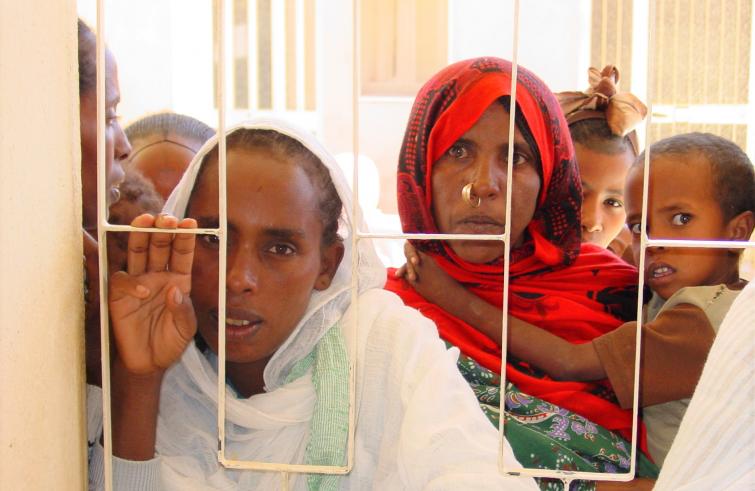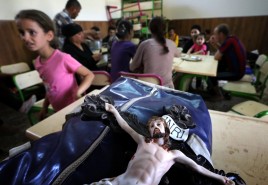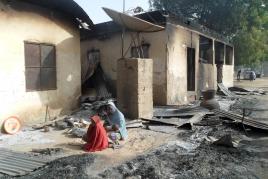
Sexual violence, forced marriages, physical violence, house arrests and psychological violence for women; physical violence, psychological violence, economic harassment (employment/access to jobs), incarceration and military conscription service against conscience, for men: these are the main Pressure Points affecting Christian men and women throughout the world as outlined in the 2023 Gender-Specific Persecution Report (GSRP) released by Open Doors, an organization that has ensured over six decades of practical support and advocacy for Christians persecuted for their beliefs, researching causes and solutions to persecution at local level. The Report, entitled “A Web of Forces,” released on March 8, illustrates, with facts and figures, the extent to which the impact of numerous persecution pressures combined can overwhelm, subvert, and threaten the stability of Christian families. “Within households – reads the Report – each individually experienced web of religious persecution can merge together to create a collective web of entangling pressures for the family. The risks are rejection of the faith by the next generation, one family member or all fleeing the country, or intolerable economic or social instability.” The research findings confirm that “whether for men or women, boys or girls, religious persecution is rarely experienced as a single, isolated Pressure Point. Although persecution is more focused for men and more complex for women, both genders are likely to experience the webbing nature of persecution either through the multiplicity of areas in which they experience coercion or punishment, or the multiplicity of actors who perpetrate these acts.”
 Sub-Saharan Africa. Sub-Saharan Africa, states the Report, is the region where gender most shapes the experience of religious persecution for Christian women. It is also the most deadly-region for Christian men, where more than 89% of the Christians killed for faith-related reasons occurred, almost exclusively in Nigeria. Nigeria – along with Cameroon and Somalia – are the countries where being a female will most shape how a Christian woman experiences religious persecution, due in large part to contextually specific and intertwining cultural and conflict dynamics which normalize gender-based violence. Nearly all World Watch List (WWL) 2023 Top 50 Sub-Saharan countries are among the countries with the most gender-specific experience of religious persecution for women. For men, however, Latin America is the region where Christian men and boys face the most multifaceted gender-specific religious persecution. Christian men in Colombia, Nicaragua, Cuba and Mexico face multiple persecution engines and a greater diversity of gender-specific Pressure Points per country than elsewhere around the globe.
Sub-Saharan Africa. Sub-Saharan Africa, states the Report, is the region where gender most shapes the experience of religious persecution for Christian women. It is also the most deadly-region for Christian men, where more than 89% of the Christians killed for faith-related reasons occurred, almost exclusively in Nigeria. Nigeria – along with Cameroon and Somalia – are the countries where being a female will most shape how a Christian woman experiences religious persecution, due in large part to contextually specific and intertwining cultural and conflict dynamics which normalize gender-based violence. Nearly all World Watch List (WWL) 2023 Top 50 Sub-Saharan countries are among the countries with the most gender-specific experience of religious persecution for women. For men, however, Latin America is the region where Christian men and boys face the most multifaceted gender-specific religious persecution. Christian men in Colombia, Nicaragua, Cuba and Mexico face multiple persecution engines and a greater diversity of gender-specific Pressure Points per country than elsewhere around the globe.
 Use of sexual violence against women. The Report found that sexual violence against persecuted Christian women and girls aims to objectify them as sexual objects and bearers of shame. Sexual violence, forced marriages and human trafficking oppress Christian women and girls in several regions of the world, often serving as tools for punishing and shaming Christian families and communities. Widely regarded as inferior, women are targeted in their ability to procreate and in their sexual purity. Kidnapped, raped, sold as brides, especially in Asian countries, or forced into sexual slavery by extremist groups in Africa. They are targeted for display by these groups as war trophies that will give birth to prospective fighters. More specifically, Faith-based sexual violence is recorded as a risk for Christian women and girls in 86% of the WWL Top 50 countries; forced marriage in 84% of the countries; physical violence in 76% of the countries; house arrest in 66% of the countries; and psychological violence in 62% of the countries.
Use of sexual violence against women. The Report found that sexual violence against persecuted Christian women and girls aims to objectify them as sexual objects and bearers of shame. Sexual violence, forced marriages and human trafficking oppress Christian women and girls in several regions of the world, often serving as tools for punishing and shaming Christian families and communities. Widely regarded as inferior, women are targeted in their ability to procreate and in their sexual purity. Kidnapped, raped, sold as brides, especially in Asian countries, or forced into sexual slavery by extremist groups in Africa. They are targeted for display by these groups as war trophies that will give birth to prospective fighters. More specifically, Faith-based sexual violence is recorded as a risk for Christian women and girls in 86% of the WWL Top 50 countries; forced marriage in 84% of the countries; physical violence in 76% of the countries; house arrest in 66% of the countries; and psychological violence in 62% of the countries.
Men: the goal is to force them out of the picture. With regard to Christian men and boys, persecution aims to force them out of the picture. In all regions, the Report says, men and boys are at risk of being abducted, imprisoned, beaten, subject to false charges or forced to join militia groups or criminal gangs. Christian men are more likely to be killed because of their faith, due to the attempt to remove them from socially expected roles as leaders, protectors and financial providers of the Christian community. In several regions, men engaged in church leadership face greater vulnerability.
Middle East and North Africa. The 2023 GSRP Report also features a Focus on the religious persecution network that ensnares Christian men and women in the Middle East and North Africa (MENA) region. Persecution can make women extremely vulnerable, subjected to digital and physical persecution, especially when they are stripped of all opportunities to express their religious beliefs, or meet other Christians. Phone messaging, location tracking and social media accounts can be monitored, and devices confiscated as a first step of isolation and punishment in countries such as Qatar and Saudi Arabia. In the Middle East and North Africa, Christian women who come from a Muslim background are most at risk of forced divorce and forced marriage and have no opportunity to choose their household arrangements or the people they live with. In turn, men who convert to Christianity in the MENA region are more likely to experience rejection and loss of support from their families and remain without any social security, hindered at every opportunity when they try to affirm their independence, despite their status as men being comparatively advantageous.
Ranking. Finally, the Report includes a list of the top 20 countries where gender most shapes the experience of persecution (unprecedented.) GSRP Country rankings for women see Nigeria in first place, followed by Cameroon, Somalia, Sudan, Syria, Ethiopia, Niger, India, Pakistan, and Mali. For men Colombia ranks first, followed by Nicaragua, Cuba, Mexico, India, Cameroon, Sudan, Pakistan, Nigeria, and Bangladesh.
Space for change exists. A common refrain regarding gender-based violence and general equality for women is that the status today is far better than it once was, although annually gathered data highlights the ongoing prevalence of gender-targeted discrimination and its effective use as a means of religious persecution. Furthermore, as 30 years of WWL data shows: the trends of religious persecution are of increased severity. Religious persecution is increasing – and recognizing the commonplace, yet specific, gender-specific forms in which religious persecution manifests can allow advocates and practitioners alike to be better informed regarding the necessary steps to decrease the scope for persecution throughout legal systems and through community responses.












